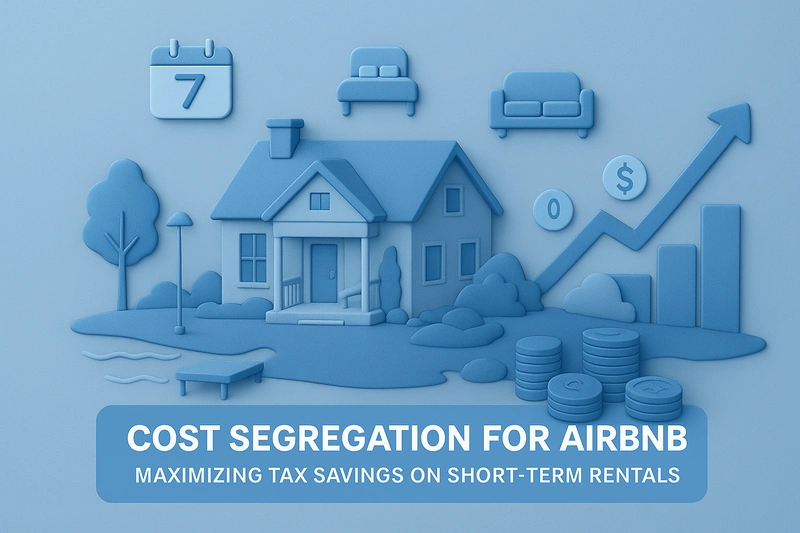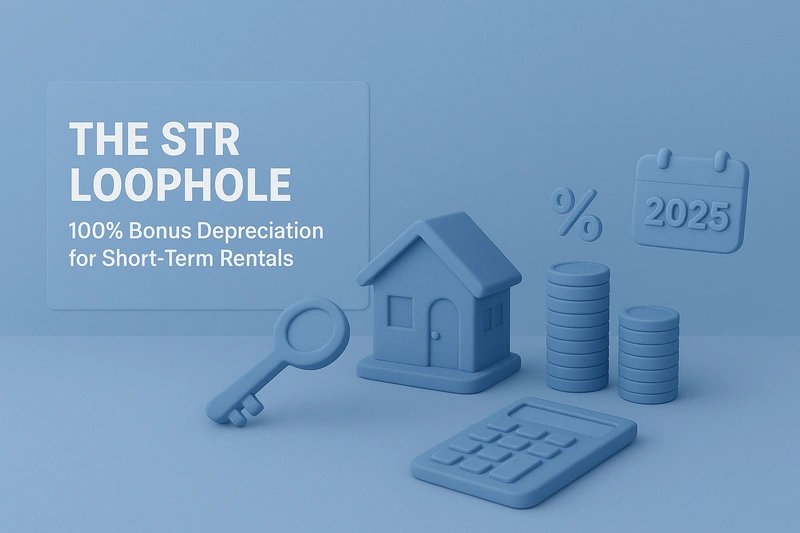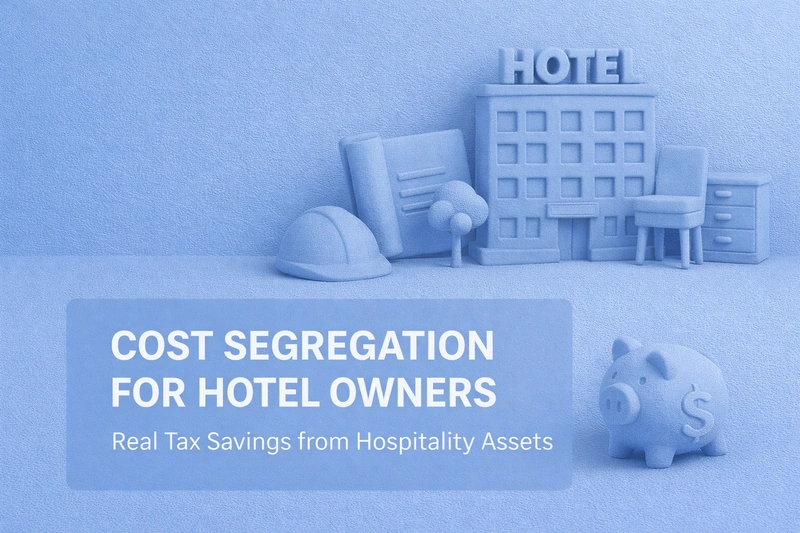When a colleague of mine purchased a lakeside cottage in a popular tourist town, he originally intended it as a family retreat. For the first few months, it was mostly weekends with friends and family.
But by the following summer, he listed it on Airbnb to offset the mortgage. Within the first year, bookings filled nearly every weekend, and the rental income exceeded expectations. Unfortunately, so did the tax bill.
When he called me to go over the numbers, it was obvious that standard depreciation was barely making a dent. I suggested we run a cost segregation study. Within a few weeks, we’d identified a significant portion of the property (including furnishings, decking, and landscaping) that could be depreciated on an accelerated schedule.
The shift translated into tens of thousands in tax savings in year one alone. That money he immediately reinvested into high-end amenities and professional photography to boost nightly rates.
For many Airbnb hosts, cost segregation is the lever that turns a decent return into an exceptional one. While it’s a tool often associated with large commercial real estate projects, short-term rental operators are discovering its value in accelerating depreciation and boosting cash flow.
Understanding How Airbnb Income Is Taxed
Short-term rental income is taxed differently than many realize. If your property is rented out for an average of seven days or fewer at a time, the IRS generally treats it more like an active business than a passive rental activity. This means your income could be reported on Schedule C, potentially subject to self-employment taxes, but it also means certain deductions may be more accessible.
Depreciation is one of the most powerful deductions in real estate. Normally, residential rental property is depreciated over 27.5 years, allowing you to deduct a small portion of the property’s cost each year. While that’s useful, it’s slow. For an Airbnb investor who’s trying to recover costs quickly and reinvest in growth, standard depreciation can feel like a brake on momentum.
Here are some key points every Airbnb operator should understand about taxation:
- Rental duration matters: If your average stay is 7 days or less, you may be treated as running a business, not just renting a property.
- Schedule C vs. Schedule E: Schedule C treatment may bring self-employment taxes, but it can also allow you to deduct more operational expenses.
- Material participation: Meeting IRS material participation tests can let you use short-term rental losses to offset active income from other sources.
- Depreciation basics: Without cost segregation, you’ll spread deductions over 27.5 years for residential property; commercial properties depreciate over 39 years.
- Impact of personal use: Any personal stays in the property can limit deductions and require prorating expenses.
- State and local taxes: Some states and cities impose occupancy taxes or special levies on short-term rentals. These can sometimes be deductible as business expenses.
How Cost Segregation Unlocks Accelerated Depreciation for Airbnb
Cost segregation is a strategic tax tool designed to accelerate depreciation deductions by breaking a property into its individual components. Under standard IRS rules, residential rental buildings are depreciated evenly over 27.5 years, meaning your deductions trickle in slowly over decades.
Cost segregation challenges that one-size-fits-all approach by identifying portions of the property (such as furniture, fixtures, specialty lighting, and even certain outdoor improvements) that qualify for much shorter recovery periods, often 5, 7, or 15 years.
By reclassifying these components, you can front-load a significant portion of your depreciation into the early years of ownership, when cash flow is often most critical. This is especially impactful for Airbnb hosts, where:
- Furnishings and guest amenities make up a larger share of the investment than in long-term rentals.
- Regular updates and upgrades mean more assets can be reclassified over time.
- Outdoor features like patios, decks, and landscaping often qualify for faster depreciation schedules.
The process is highly structured: a qualified cost segregation firm conducts an engineering-based analysis of the property, assigns each component to its proper depreciation category, and delivers an IRS-compliant report.
When paired with bonus depreciation (which allows you to deduct a large percentage of qualifying assets in year one), the effect can be dramatic, sometimes compressing what would have been a decade of write-offs into a single tax year.
For short-term rental operators, this strategy reduces taxable income and can also generate the capital needed for property improvements, seasonal marketing campaigns, or even acquiring the next Airbnb in your portfolio.
Special Considerations for Airbnb and Short-Term Rentals
While the mechanics of cost segregation are similar across different types of real estate, short-term rentals like Airbnb properties introduce a unique mix of tax, operational, and regulatory factors that can significantly impact the outcome.
These properties often combine elements of hospitality and residential real estate, which means they don’t fit neatly into traditional rental categories. The interplay between personal use, guest turnover, furnishing requirements, and local short-term rental regulations can either enhance or limit the benefits you’ll receive from a cost segregation study.
Understanding these nuances before you commission a study ensures that your strategy is both compliant and optimized for the Airbnb business model.
- Mixed-use properties: If you live in part of the home and rent out another section, the depreciation calculation must be prorated.
- Furnishings and improvements: Short-term rentals often include fully furnished interiors, which means more assets fall into the accelerated depreciation category.
- Local regulations: Some municipalities classify short-term rentals differently for tax purposes; ensure your cost segregation provider understands these nuances.
- IRS scrutiny: Because short-term rentals can blur the line between personal and business use, accurate records are critical. Document all purchases, renovations, and the number of rental nights.
Real Numbers: Potential Tax Savings Scenarios
Let’s take a hypothetical example: you buy an Airbnb property for $500,000.
- Building value (excluding land): $400,000.
- Under standard depreciation: Annual deduction is roughly $14,545.
- Under cost segregation: A study identifies $120,000 of assets that can be depreciated over 5, 7, or 15 years.
In year one, with bonus depreciation, you might deduct up to $120,000 immediately if the property was acquired after January 19, 2025, when 100% bonus depreciation kicked back in. That’s more than eight years’ worth of standard depreciation in a single tax year.
Impact:
- If you’re in a combined federal and state tax bracket of 32%, that $120,000 deduction could translate to roughly $38,400 in tax savings right out of the gate.
- That cash can be reinvested into marketing, property improvements, or even the down payment on a second Airbnb property.
The Strategic Timing of a Cost Segregation Study for Airbnb Properties
When you perform the study matters. The right timing can mean the difference between unlocking immediate, substantial tax savings or leaving money on the table for years. In the Airbnb space, timing decisions also need to account for seasonal demand patterns and how quickly you plan to scale your short-term rental portfolio.
- Immediately after purchase: This allows you to claim the maximum upfront deduction and free up cash flow in your first year.
- After major renovations: Upgrades can significantly change your depreciation breakdown, so a new study can capture additional savings.
- Retroactively (look-back studies): You can often apply cost segregation to properties purchased in prior years, amending returns to capture missed depreciation.
For active short-term rental operators, the IRS “material participation” rules can be key. If you meet these tests, you may be able to use passive losses to offset active income (an especially powerful tool if you have high W-2 earnings or other business income).
Partnering with Experts for Maximum Impact
Maximizing the tax benefits of an Airbnb property isn’t a solo effort. The most successful short-term rental operators build a team of specialists who understand both the tax landscape and the operational demands of hospitality. Here are the key partners to have on your side:
- Cost segregation firm – Identifies and documents the property components eligible for accelerated depreciation, ensuring compliance with IRS guidelines while maximizing deductions.
- Tax strategist or CPA with short-term rental expertise – Integrates depreciation strategies into your broader tax plan, manages material participation tests, and advises on changes in tax law.
- Real estate attorney – Navigates zoning rules, occupancy limits, and regulatory classifications that can affect property use and tax treatment.
- Insurance broker specializing in STR coverage – Structures policies that account for guest turnover, high-value furnishings, and regional risks.
- Property management firm – Maintains detailed records of repairs, upgrades, and rental activity to support depreciation claims and streamline operations.
By involving these professionals early (ideally before your first tax filing as an Airbnb operator), you can ensure that your strategy is proactive, compliant, and aligned with your long-term investment goals.
Bringing It All Together for Better Airbnb ROI
Airbnb hosting is a business, one that rewards proactive, informed decisions. Cost segregation is one of the most effective strategies for unlocking early cash flow, enabling hosts to reinvest in guest experience, expand their portfolio, and withstand seasonal revenue fluctuations.
If you operate an Airbnb and want to maximize your tax position through cost segregation for Airbnb properties, R.E. Cost Seg can help you unlock hidden savings and strengthen your cash flow position. Their meticulous, IRS-compliant approach ensures your deductions stand up to scrutiny while delivering maximum benefit.






